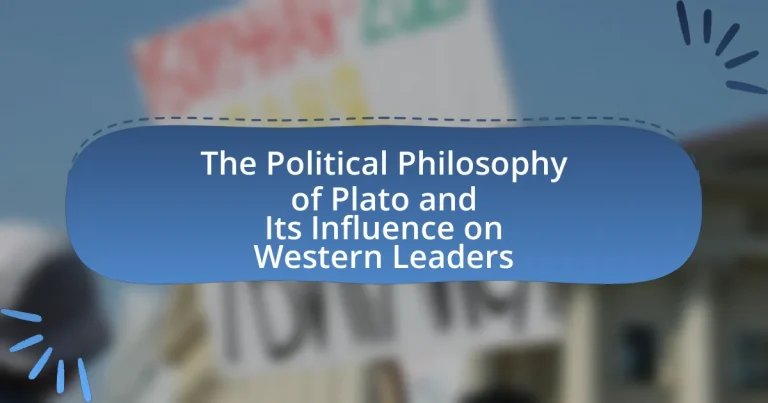The political philosophy of Plato, primarily articulated in “The Republic,” centers on the concepts of justice and the ideal state, advocating for governance by philosopher-kings who prioritize the common good. Plato’s structured society is divided into three classes—rulers, auxiliaries, and producers—each fulfilling specific roles to maintain harmony. His aristocratic background, experiences during the Peloponnesian War, and mentorship under Socrates significantly shaped his views on governance, emphasizing the importance of wisdom and moral integrity in leadership. The article explores how Plato’s ideas have influenced Western political thought, the formation of democratic principles, and the policies of historical leaders, while also addressing criticisms of his idealism and authoritarian tendencies.

What is the Political Philosophy of Plato?
The political philosophy of Plato centers on the concept of justice and the ideal state, as articulated in his work “The Republic.” Plato argues that a just society is governed by philosopher-kings, who possess wisdom and virtue, ensuring that rulers prioritize the common good over personal interests. He emphasizes the importance of a structured society, divided into three classes: rulers, auxiliaries, and producers, each fulfilling its role to maintain harmony. This framework is supported by Plato’s Theory of Forms, which posits that the ideal forms of justice and governance exist beyond the physical world, guiding the rulers in their decisions. Plato’s ideas have profoundly influenced Western political thought, shaping the foundations of political philosophy and governance.
How did Plato’s background influence his political philosophy?
Plato’s background significantly influenced his political philosophy, particularly through his aristocratic lineage and exposure to Socratic thought. Born into an influential Athenian family around 427 BCE, Plato’s social status provided him access to education and political circles, shaping his views on governance and justice. His experiences during the Peloponnesian War and the subsequent political turmoil in Athens led him to critique democracy, which he perceived as flawed and susceptible to mob rule. This perspective is evident in his works, such as “The Republic,” where he advocates for a philosopher-king as the ideal ruler, reflecting his belief that only those with true knowledge should govern. Additionally, his relationship with Socrates, who was executed for his beliefs, instilled in Plato a commitment to the pursuit of truth and the importance of moral integrity in leadership. These elements of his background directly informed his vision of an ideal state and the role of the philosopher in society.
What key events in Plato’s life shaped his views on governance?
Key events in Plato’s life that shaped his views on governance include his experiences during the Peloponnesian War, his relationship with Socrates, and his travels to Sicily. The Peloponnesian War exposed Plato to the failures of Athenian democracy, leading him to question the effectiveness of popular rule. His mentorship under Socrates, who was executed for his beliefs, instilled in Plato a belief in the importance of philosophical wisdom in governance. Additionally, his visits to Sicily, where he attempted to implement his philosophical ideas in political practice, further influenced his thoughts on the ideal state, as documented in his works like “The Republic.” These experiences collectively informed his advocacy for a government led by philosopher-kings, emphasizing the need for knowledgeable rulers.
How did Plato’s education contribute to his political ideas?
Plato’s education significantly shaped his political ideas by providing him with a foundation in philosophy, mathematics, and the study of governance. His time as a student of Socrates instilled in him the importance of ethical inquiry and the pursuit of truth, which became central to his political philosophy. Additionally, his exposure to the political turmoil of Athens, particularly the Peloponnesian War, influenced his views on justice and the ideal state. Plato’s writings, such as “The Republic,” reflect his belief in philosopher-kings as the ideal rulers, a concept rooted in his educational background that emphasized rational thought and moral integrity as essential qualities for leadership.
What are the main concepts in Plato’s political philosophy?
The main concepts in Plato’s political philosophy include the idea of the ideal state, the role of the philosopher-king, the theory of forms, and the concept of justice. Plato argues that the ideal state is governed by philosopher-kings, who possess wisdom and knowledge, ensuring that rulers make decisions for the common good rather than personal gain. His theory of forms posits that the material world is a reflection of a higher reality, influencing how political structures should aspire to embody these ideals. Additionally, Plato’s concept of justice emphasizes harmony within the state, where each class performs its designated role, contributing to the overall stability and virtue of society. These concepts are foundational in Western political thought, influencing leaders and theorists throughout history.
What is the concept of the ideal state according to Plato?
The concept of the ideal state according to Plato is articulated in his work “The Republic,” where he envisions a society governed by philosopher-kings. Plato argues that the ideal state is structured around three classes: the rulers (philosopher-kings), the auxiliaries (warriors), and the producers (farmers and artisans). This tripartite structure is designed to ensure harmony and justice, with each class performing its designated role for the common good. Plato supports this vision by asserting that only those who possess true knowledge and wisdom, specifically the understanding of the Forms, particularly the Form of the Good, are fit to rule. This philosophical foundation emphasizes the importance of knowledge and virtue in governance, distinguishing Plato’s ideal state from other political theories of his time.
How does Plato define justice in a political context?
Plato defines justice in a political context as the principle of specialization, where each class in society performs its designated role for the common good. In “The Republic,” he argues that a just society is one where rulers (philosopher-kings), warriors, and producers each fulfill their specific functions, leading to harmony and order. This definition emphasizes that justice is not merely an individual virtue but a collective one, essential for the stability and well-being of the state. Plato’s concept of justice is validated by his assertion that when each class performs its role effectively, the society as a whole achieves balance and justice, reflecting his belief in the interdependence of social roles.
Why is Plato’s political philosophy significant in Western thought?
Plato’s political philosophy is significant in Western thought because it laid the foundational concepts of justice, governance, and the ideal state. His work, particularly in “The Republic,” introduces the idea of philosopher-kings, advocating that the most knowledgeable should rule for the benefit of all. This concept has influenced various political theories and systems throughout history, including the development of democratic ideals and the role of ethics in governance. Additionally, Plato’s emphasis on the importance of education and the pursuit of the common good has shaped Western political discourse, encouraging leaders to consider the moral implications of their decisions.
What impact did Plato’s ideas have on subsequent political theories?
Plato’s ideas significantly influenced subsequent political theories by introducing concepts such as the ideal state, the philosopher-king, and the importance of justice in governance. His work, particularly in “The Republic,” established a framework for evaluating political systems based on their ability to achieve the common good and promote virtue among citizens. This emphasis on rational governance and the role of educated leaders shaped later thinkers, including Aristotle, who built upon and critiqued Plato’s theories, and modern political theorists who explore the balance between democracy and elitism. Plato’s vision of a just society continues to resonate in contemporary discussions about governance, ethics, and the role of leadership in politics.
How have modern interpretations of Plato’s philosophy evolved?
Modern interpretations of Plato’s philosophy have evolved significantly, shifting from traditional readings focused on idealism to contemporary analyses that emphasize pragmatism and contextual relevance. Scholars now explore Plato’s ideas through various lenses, including feminist theory, postmodernism, and political realism, which highlight the complexities of his thoughts on justice, governance, and the role of the philosopher-king. For instance, the reinterpretation of the “Allegory of the Cave” has led to discussions about perception and reality in the context of modern media and technology, illustrating how Plato’s insights remain pertinent in contemporary debates about knowledge and power. This evolution reflects a broader trend in philosophy where ancient texts are reexamined to address current societal issues, demonstrating the lasting impact of Plato’s work on modern political thought.
How has Plato’s Political Philosophy influenced Western Leaders?
Plato’s political philosophy has significantly influenced Western leaders by promoting the idea of philosopher-kings and the importance of justice in governance. His concept, articulated in “The Republic,” suggests that the most knowledgeable and virtuous individuals should lead society, which has inspired various political theories and practices throughout history. For instance, leaders such as Thomas Jefferson and John Adams incorporated Platonic ideals into the foundation of American democracy, emphasizing reason and moral integrity in leadership. Additionally, the emphasis on the common good over individual interests in Plato’s work has shaped modern democratic principles, encouraging leaders to prioritize societal welfare.
Which historical leaders have drawn inspiration from Plato’s ideas?
Historical leaders who have drawn inspiration from Plato’s ideas include Thomas More, who reflected Platonic ideals in his work “Utopia,” and the founding fathers of the United States, particularly in their vision of a republic based on reason and justice. Additionally, philosophers like Friedrich Nietzsche and political figures such as Winston Churchill have acknowledged Plato’s influence on their thoughts regarding governance and ethics. These leaders utilized Plato’s concepts of ideal forms and the philosopher-king to shape their political philosophies and governance models.
What specific aspects of Plato’s philosophy did these leaders adopt?
Leaders adopted several specific aspects of Plato’s philosophy, particularly his ideas on the ideal state, the role of the philosopher-king, and the importance of justice. Plato’s concept of the ideal state, as outlined in “The Republic,” emphasizes a structured society governed by rational principles and the pursuit of the common good. This notion influenced leaders to prioritize governance based on philosophical reasoning rather than mere power. Additionally, the philosopher-king model, where the most knowledgeable and virtuous individuals lead, inspired leaders to value wisdom and education in political leadership. Lastly, Plato’s emphasis on justice as a fundamental virtue shaped leaders’ approaches to law and governance, encouraging them to create systems that promote fairness and societal harmony.
How did Plato’s vision of governance manifest in their policies?
Plato’s vision of governance manifested in his policies through the establishment of a philosopher-king model, where rulers are wise and knowledgeable, prioritizing the common good over personal interests. This concept is articulated in his work “The Republic,” where he argues that only those who understand the Forms, particularly the Form of the Good, are fit to govern. Plato’s policies emphasized the importance of education and the selection of leaders based on merit, advocating for a structured society divided into three classes: rulers, auxiliaries, and producers. This hierarchical structure aimed to create a just society, where each class performs its role effectively, ensuring harmony and stability.
What role did Plato’s philosophy play in the development of Western political systems?
Plato’s philosophy significantly influenced the development of Western political systems by introducing concepts of justice, the ideal state, and the role of the philosopher-king. His work, particularly in “The Republic,” proposed that a just society is governed by wise rulers who possess knowledge of the good, which laid the groundwork for later political theories emphasizing rational governance. Additionally, Plato’s ideas about the importance of education and the role of the state in shaping citizens’ virtues have been foundational in shaping democratic ideals and civic responsibility in Western political thought. His influence is evident in the writings of later philosophers such as Aristotle and in the development of political systems that prioritize rationality and ethical governance.
How did Plato’s ideas influence the formation of democratic principles?
Plato’s ideas significantly influenced the formation of democratic principles by emphasizing the importance of rational governance and the role of the philosopher-king. In his work “The Republic,” Plato argued that a just society requires rulers who possess wisdom and knowledge, which laid the groundwork for the belief that informed and educated citizens should participate in governance. This notion contributed to the development of democratic ideals that prioritize civic engagement and the pursuit of the common good. Furthermore, Plato’s critique of democracy, particularly in “The Republic,” highlighted the dangers of mob rule and the need for a balanced political system, prompting later thinkers to refine democratic principles to ensure stability and justice.
What connections exist between Plato’s philosophy and modern political ideologies?
Plato’s philosophy significantly influences modern political ideologies, particularly through concepts of justice, the role of the philosopher-king, and the ideal state. His notion of justice, as articulated in “The Republic,” emphasizes the importance of a just society governed by wise rulers, which resonates with contemporary democratic ideals that advocate for informed leadership and civic responsibility. Additionally, the philosopher-king concept has inspired various political theories advocating for technocracy and meritocracy, where governance is entrusted to those with expertise and knowledge. Furthermore, Plato’s vision of the ideal state has shaped discussions around utopianism and the pursuit of a perfect society, influencing both socialist and liberal ideologies that seek to improve social conditions. These connections illustrate how Plato’s foundational ideas continue to inform and challenge modern political thought.
What are the criticisms of Plato’s Political Philosophy?
Plato’s political philosophy faces several criticisms, primarily centered on its idealism, authoritarianism, and lack of practicality. Critics argue that Plato’s vision of a philosopher-king ruling an ideal state is unrealistic, as it assumes that rulers can possess absolute wisdom and virtue, which is rarely the case in reality. Additionally, his advocacy for a rigid class structure and the suppression of individual freedoms in favor of the collective good raises concerns about authoritarianism and the potential for tyranny. Furthermore, the implementation of his ideas, such as the abolition of private property and family, is seen as impractical and detrimental to human motivation and social cohesion. These criticisms highlight the challenges of applying Plato’s theoretical constructs to real-world governance.
What are the main arguments against Plato’s ideal state concept?
The main arguments against Plato’s ideal state concept include its impracticality, the suppression of individuality, and the potential for authoritarianism. Critics argue that the rigid class structure and the philosopher-king model are unrealistic, as they assume a level of wisdom and virtue that is rarely found in leaders. Additionally, the ideal state’s emphasis on collective good over individual rights can lead to the suppression of personal freedoms and creativity. Historical examples, such as totalitarian regimes that have attempted to implement similar ideals, demonstrate the risks of authoritarianism inherent in Plato’s vision.
How do critics view the feasibility of Plato’s philosopher-king model?
Critics generally view the feasibility of Plato’s philosopher-king model as impractical due to its reliance on an idealized ruler possessing both wisdom and virtue. This model assumes that such individuals can be identified and trusted to govern justly, which critics argue is unrealistic in the context of human nature and political systems. For instance, political theorist Karl Popper criticized the model in his work “The Open Society and Its Enemies,” asserting that it could lead to authoritarianism, as it concentrates power in the hands of a few who claim superior knowledge. Additionally, the historical absence of philosopher-kings in practice raises questions about the model’s applicability in real-world governance, further supporting the view that it is not a feasible political solution.
What are the implications of Plato’s views on individual freedom?
Plato’s views on individual freedom imply that true freedom is found within the context of a just society, where individuals align their desires with the common good. In his work “The Republic,” Plato argues that individual freedom should not lead to chaos or moral decay; instead, it should be guided by reason and the pursuit of virtue. This perspective suggests that personal liberties must be balanced with social responsibilities, emphasizing that the ideal state prioritizes collective harmony over unrestricted individualism. Plato’s philosophy has influenced Western leaders by promoting the idea that governance should cultivate moral citizens who contribute to societal well-being, rather than merely maximizing personal freedoms without regard for the community.
How have these criticisms shaped contemporary political thought?
Criticisms of Plato’s political philosophy have significantly shaped contemporary political thought by prompting a reevaluation of idealism versus realism in governance. These critiques, particularly regarding the practicality of Plato’s ideal state and his views on the role of the philosopher-king, have led modern theorists to advocate for more democratic and participatory forms of governance. For instance, the emphasis on individual rights and the critique of authoritarianism in contemporary political discourse can be traced back to challenges against Plato’s hierarchical structures. Additionally, the debate surrounding the balance between moral ideals and political realities continues to influence contemporary discussions on governance, as seen in the works of political theorists like John Rawls and Hannah Arendt, who emphasize justice and the importance of public participation in political life.
What lessons can modern leaders learn from the critiques of Plato’s philosophy?
Modern leaders can learn the importance of questioning idealism and embracing pragmatism from the critiques of Plato’s philosophy. Critics argue that Plato’s ideal forms and his vision of a philosopher-king can lead to authoritarianism, as seen in the works of Aristotle and later thinkers who emphasize the need for practical governance and the value of democratic processes. This critique highlights the necessity for leaders to balance ideals with the realities of human behavior and societal complexities, ensuring that governance remains adaptable and responsive to the needs of the populace. By recognizing the limitations of rigid philosophical ideals, modern leaders can foster more inclusive and effective leadership practices that prioritize the welfare of diverse communities.
What practical insights can be drawn from Plato’s Political Philosophy for today’s leaders?
Plato’s Political Philosophy offers practical insights for today’s leaders, emphasizing the importance of justice, the role of the philosopher-king, and the necessity of education. Justice, as defined by Plato, is the harmony achieved when each class in society performs its appropriate role, which leaders can apply by promoting fairness and equity in governance. The concept of the philosopher-king suggests that leaders should possess wisdom and knowledge, guiding them to make informed decisions for the common good. Furthermore, Plato advocates for a robust educational system to cultivate virtuous citizens, indicating that leaders should prioritize education to foster informed and engaged communities. These insights underscore the relevance of Plato’s ideas in shaping ethical and effective leadership today.
How can leaders apply Plato’s ideas to modern governance challenges?
Leaders can apply Plato’s ideas to modern governance challenges by emphasizing the importance of philosopher-kings, who govern based on wisdom and virtue rather than mere popularity or power. Plato argued in “The Republic” that rulers should possess knowledge of the good and be committed to the welfare of the state, which can guide contemporary leaders in prioritizing ethical decision-making and long-term societal benefits over short-term gains. This approach can be seen in modern governance through the implementation of policies that focus on education, civic responsibility, and the common good, reflecting Plato’s belief in the necessity of an informed and virtuous leadership to address complex societal issues effectively.
What best practices can be derived from Plato’s vision of justice and leadership?
Plato’s vision of justice and leadership emphasizes the importance of virtue, wisdom, and the role of the philosopher-king as best practices for effective governance. He argues that leaders should possess knowledge and moral integrity to ensure just rule, as seen in his work “The Republic,” where he outlines the ideal state governed by wise rulers. This approach advocates for leaders to prioritize the common good over personal interests, fostering a society where justice prevails. Additionally, Plato’s emphasis on education and the cultivation of character in leaders supports the idea that informed and ethical decision-making is crucial for sustainable leadership.


